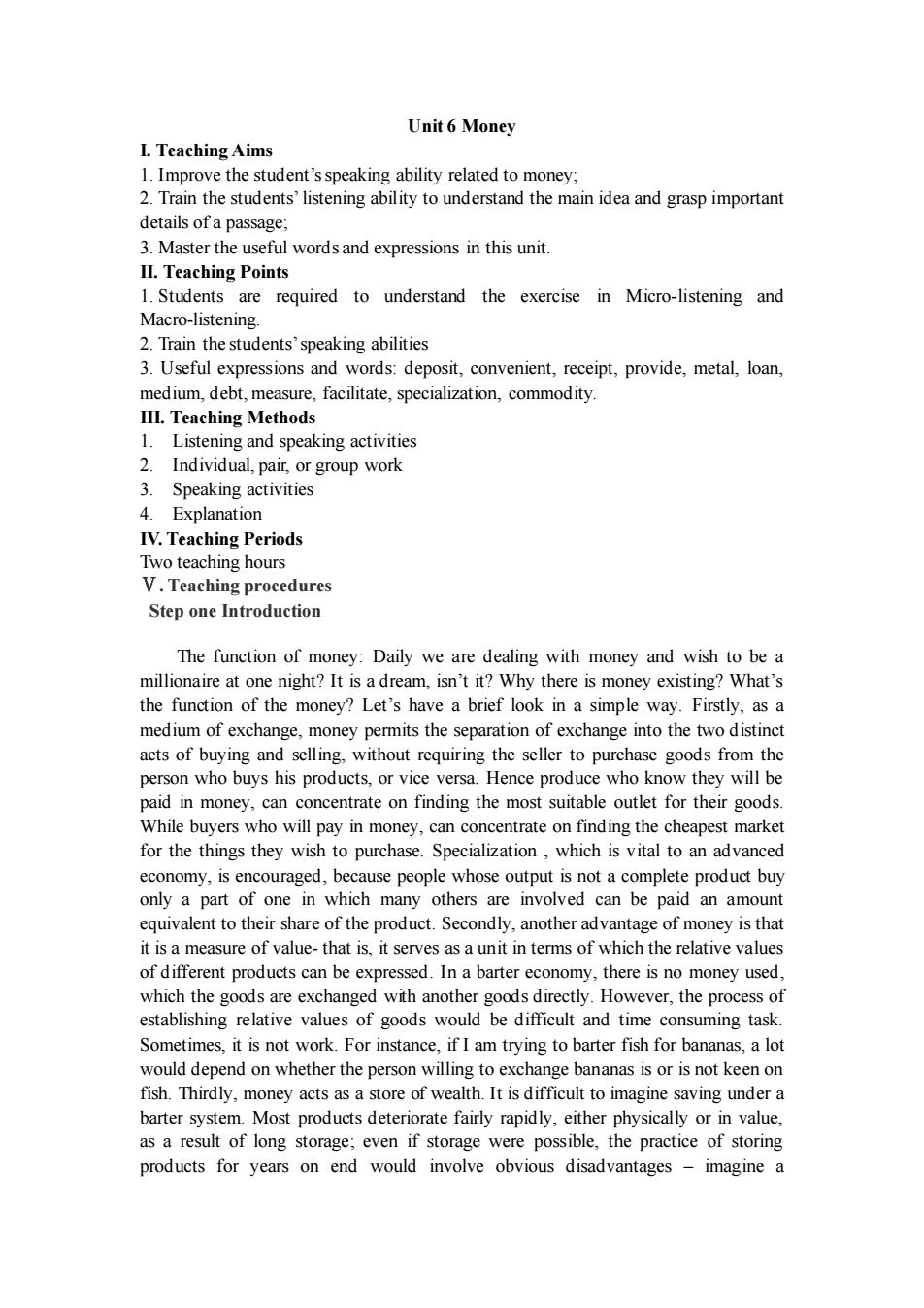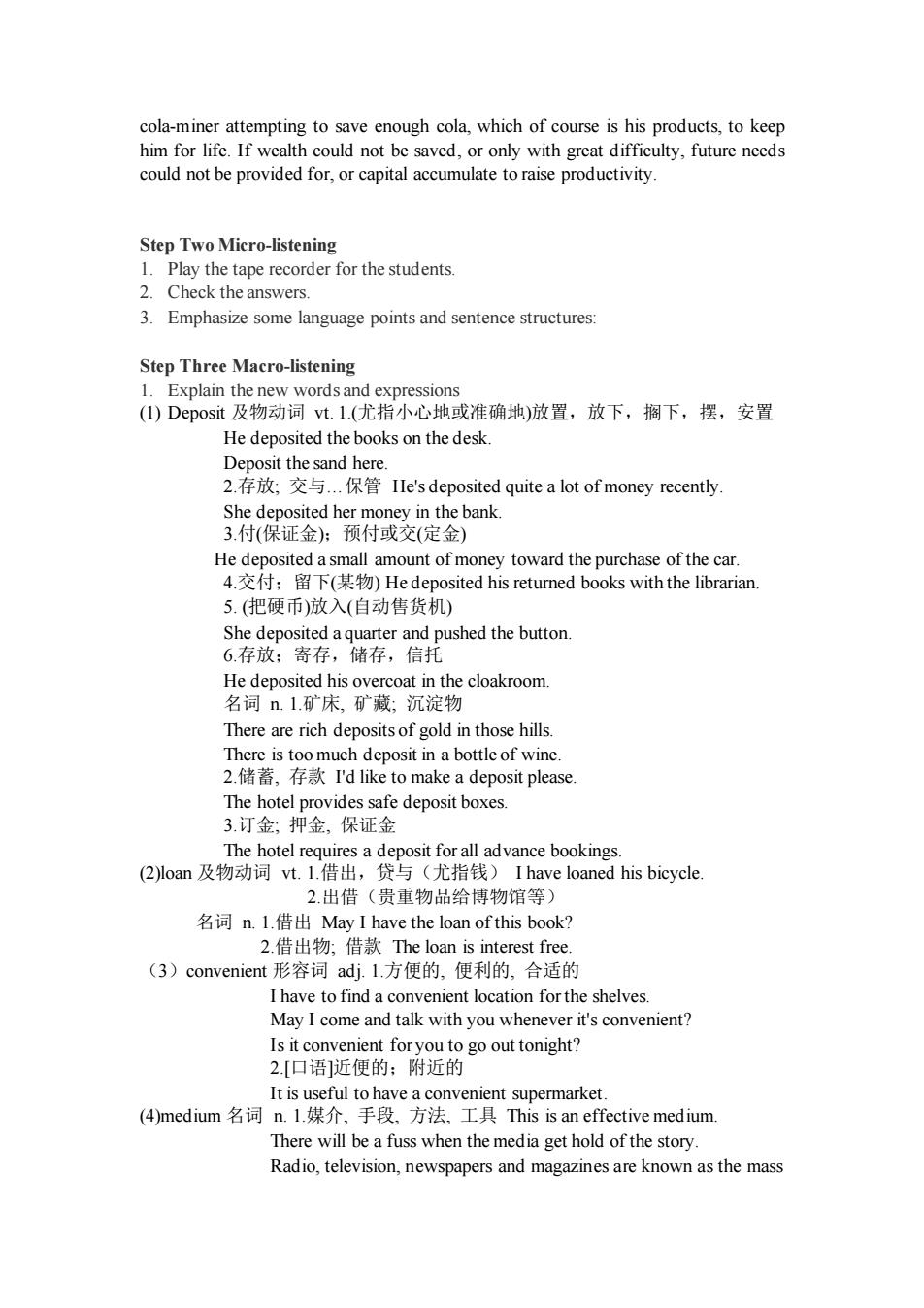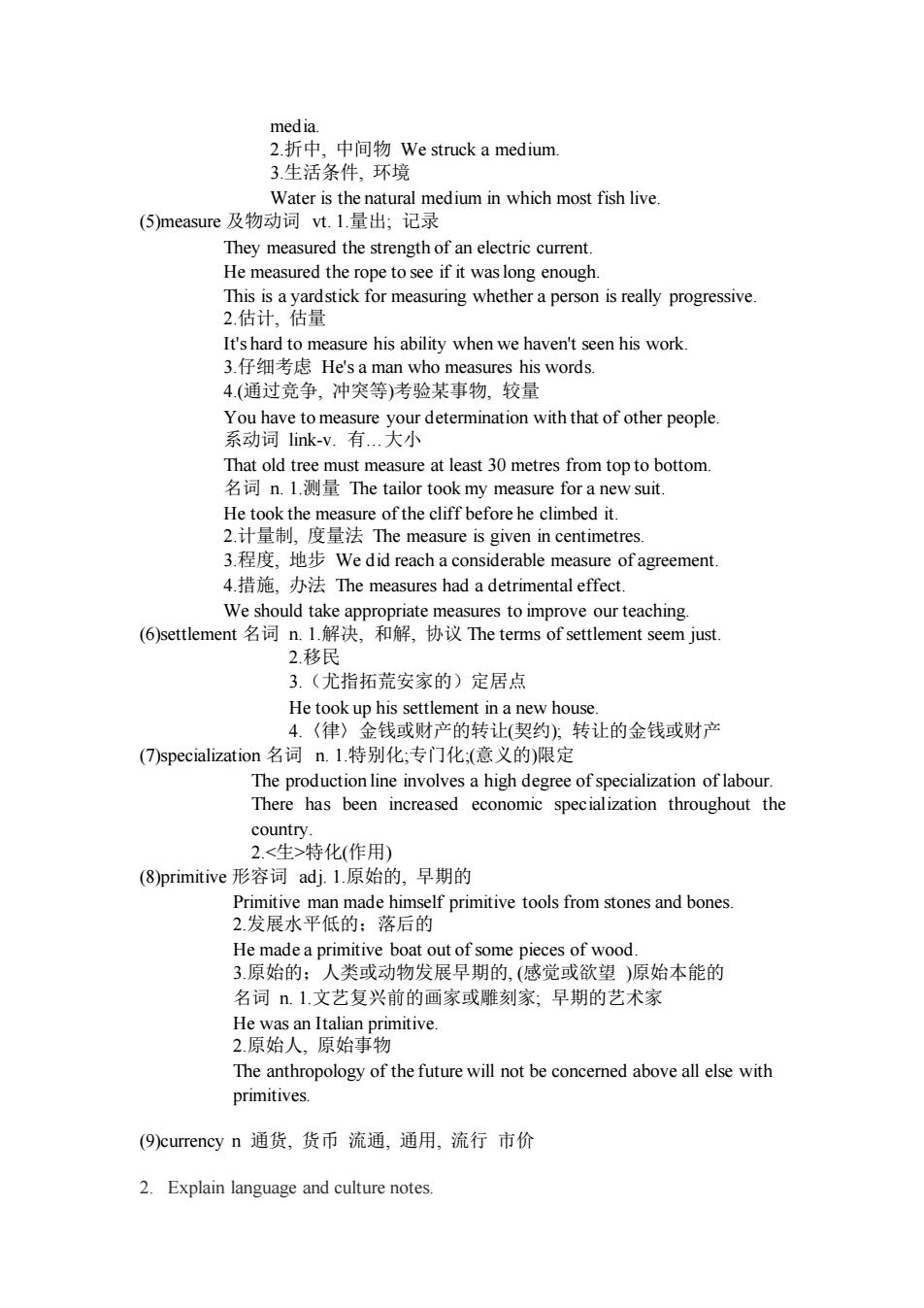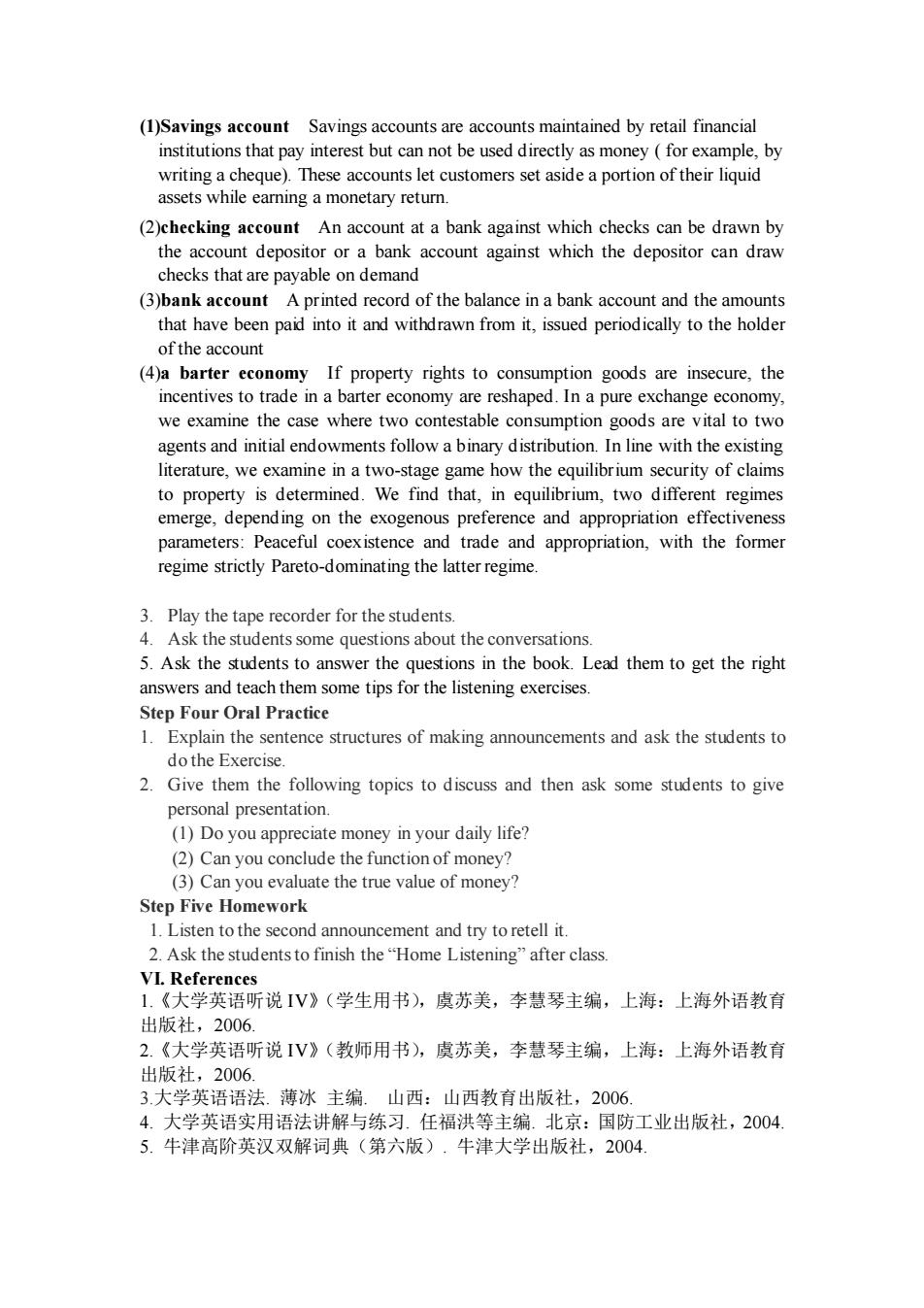
Unit 6 Money I.Teaching Aims Improve the student's speaking ability related to money: 2.Train the students'listening ability to understand the main idea and grasp important details of a passage: 3.Master the useful words and expressions in this unit II.Teaching Points Students are required to understand the exercise in Micro-listening and Macro-listening. 2.Train the students'speaking abilities 3.Useful expressions and words:deposit,convenient,receipt,provide,metal,loan, medium,debt,measure,facilitate,specialization,commodity. II.Teaching Methods Listening and speaking activities Individual,pair,or group work 3.Speaking activities 4 Explanation IV.Teachi ng Periods Iwo tea ing hour V.Teaching procedures Step one Introduction The function of money:Daily we are dealing with money and wish to be a millionaire at one night?It is a dream,isn't it?Why there is money existing?What's the functi of the e money?Let's have a brief look ina simple wa Firstly,as medium of exchange,money permits the separation of exchange into the two distinc acts of buying and selling,without requiring the seller to purchase goods from the person who buys his products,or vice versa.Hence produce who know they will be paid in money,can concentrate on finding the most suitable outlet for their goods. While bu ate on finding the choa pe arket for the things they wish to purchase.Specialization,which is vital to an advanced economy,is encouraged,because people whose output is not a complete product buy only a part of one in which many others are involved can be paid an amount equivalent to their share of the product.Secondly,another advantage of money is that it is a measure of value-that is,it serves as a unit in terms of which the relative values rent products can be expres d.In a barte onomy,there is no money used which the goods are exchanged with another goods directly.However.the process of establishing relative values of goods would be difficult and time consuming task Sometimes,it is not work.For instance,if I am trying to barter fish for bananas,a lot would depend on whether the person willing to exchange bananas is or is not keen on fish.Thirdly, yact s a stor of wea h.It is ult to ag saving und barter system Most products deteriorate fairly rapidly,either physically or in value as a result of long storage;even if storage were possible,the practice of storing products for years on end would involve obvious disadvantages -imagine a
Unit 6 Money I. Teaching Aims 1. Improve the student’s speaking ability related to money; 2. Train the students’ listening ability to understand the main idea and grasp important details of a passage; 3. Master the useful words and expressions in this unit. II. Teaching Points 1. Students are required to understand the exercise in Micro-listening and Macro-listening. 2. Train the students’ speaking abilities 3. Useful expressions and words: deposit, convenient, receipt, provide, metal, loan, medium, debt, measure, facilitate, specialization, commodity. III. Teaching Methods 1. Listening and speaking activities 2. Individual, pair, or group work 3. Speaking activities 4. Explanation IV. Teaching Periods Two teaching hours Ⅴ. Teaching procedures Step one Introduction The function of money: Daily we are dealing with money and wish to be a millionaire at one night? It is a dream, isn’t it? Why there is money existing? What’s the function of the money? Let’s have a brief look in a simple way. Firstly, as a medium of exchange, money permits the separation of exchange into the two distinct acts of buying and selling, without requiring the seller to purchase goods from the person who buys his products, or vice versa. Hence produce who know they will be paid in money, can concentrate on finding the most suitable outlet for their goods. While buyers who will pay in money, can concentrate on finding the cheapest market for the things they wish to purchase. Specialization , which is vital to an advanced economy, is encouraged, because people whose output is not a complete product buy only a part of one in which many others are involved can be paid an amount equivalent to their share of the product. Secondly, another advantage of money is that it is a measure of value- that is, it serves as a unit in terms of which the relative values of different products can be expressed. In a barter economy, there is no money used, which the goods are exchanged with another goods directly. However, the process of establishing relative values of goods would be difficult and time consuming task. Sometimes, it is not work. For instance, if I am trying to barter fish for bananas, a lot would depend on whether the person willing to exchange bananas is or is not keen on fish. Thirdly, money acts as a store of wealth. It is difficult to imagine saving under a barter system. Most products deteriorate fairly rapidly, either physically or in value, as a result of long storage; even if storage were possible, the practice of storing products for years on end would involve obvious disadvantages – imagine a

which poducts.to keep him for life.If we could not e saved,or only with great difficulty,future needs could not be provided for,or capital accumulate to raise productivity. Step Two Micro-listening 1 Play the tape recorder for the students 2.Check the answers Emphasize some language points and sentence structures: Step Three Macro-listening 1 Explain the new wordsand expr ssions (1)Deposit及物动词t.1.(尤指小心地或准确地)放置,放下,搁下,摆,安置 He deposited the books on the desk P荐流姿保管ep fmo She deposited her money in the bank. 3.付(保证金):预付或交(定金) He do 4交. ount of money toward the purchase of the ca 某物Hedep nis retumed books with the librarian 5.(把硬币)放入(自动售货机) She deposited a quarter and pushed the button 6.存放:寄存,储存,信托 He deposited his overcoat in the cloakroom 名词n1矿床,矿藏:沉淀物 There are rich deposits of gold in those hills There is too much deposit in a bottle of wine. 2.储蓄,存款I'd like to make a deposit please The hotel provides safe deposit boxes. 3订金:押金,保证金 The nce bookings (2loan及物动词t.1.借 C指我 Ihave loaned his bicycle 2.出借(贵重物品给博物馆等) 名词n.1.借出May I have the loan of this book? 2借出物借数The loan is interest fre (3)convenient形容词adj,l.方便的 便利的,合适 I have to find a convenient location for the shelves. May i come and talk with you whenever it's convenient? Is it convenient for you to go out tonight? 2.口语1近便的:附近的 ve a conveni permarke This is an effective medium There will be a fuss when the media get hold of the story. Radio.television.newspapers and magazines are known as the mass
cola-miner attempting to save enough cola, which of course is his products, to keep him for life. If wealth could not be saved, or only with great difficulty, future needs could not be provided for, or capital accumulate to raise productivity. Step Two Micro-listening 1. Play the tape recorder for the students. 2. Check the answers. 3. Emphasize some language points and sentence structures: Step Three Macro-listening 1. Explain the new words and expressions (1) Deposit 及物动词 vt. 1.(尤指小心地或准确地)放置,放下,搁下,摆,安置 He deposited the books on the desk. Deposit the sand here. 2.存放; 交与…保管 He's deposited quite a lot of money recently. She deposited her money in the bank. 3.付(保证金);预付或交(定金) He deposited a small amount of money toward the purchase of the car. 4.交付;留下(某物) He deposited his returned books with the librarian. 5. (把硬币)放入(自动售货机) She deposited a quarter and pushed the button. 6.存放;寄存,储存,信托 He deposited his overcoat in the cloakroom. 名词 n. 1.矿床, 矿藏; 沉淀物 There are rich deposits of gold in those hills. There is too much deposit in a bottle of wine. 2.储蓄, 存款 I'd like to make a deposit please. The hotel provides safe deposit boxes. 3.订金; 押金, 保证金 The hotel requires a deposit for all advance bookings. (2)loan 及物动词 vt. 1.借出,贷与(尤指钱) I have loaned his bicycle. 2.出借(贵重物品给博物馆等) 名词 n. 1.借出 May I have the loan of this book? 2.借出物; 借款 The loan is interest free. (3)convenient 形容词 adj. 1.方便的, 便利的, 合适的 I have to find a convenient location for the shelves. May I come and talk with you whenever it's convenient? Is it convenient for you to go out tonight? 2.[口语]近便的;附近的 It is useful to have a convenient supermarket. (4)medium 名词 n. 1.媒介, 手段, 方法, 工具 This is an effective medium. There will be a fuss when the media get hold of the story. Radio, television, newspapers and magazines are known as the mass

media 2折中,中间物We struck a medium 3.生活条件,环境 Water is the natural medium in which most fish live. (S)measure及物动词t.1.量出;记录 They measured the strength of an electric current. He measured the ee if it waslong enough 2传fT格gMrd冰for meguring whether aperonaly progressive It's hard to measure his ability when we haven't seen his work. 3.仔细考虑He's a man who measures his words 4.(通过竞争,冲突等)考验某事物,较量 That old tree must measure at least 30 metres from top to bottom. 名词n.1.则量The tailor took my measure for a new suit He took the measure of the cliff before he climbed it. 2.计量制,度量法The measure is given in centimetres.. 3.程度,地步We did reach a considerablem easure of agreement 4.措施,办法The measures had a detrimental effect We should take appropriate measures to improve our teaching. (6)settlement名词n.l.解决,和解,协议The terms of settlement seem just 2.移民 3.(尤指拓荒安家的)定居点 He took up hi s settlement in a new house 4.〈律〉金钱或财产的转让(契约,转让的金钱或财产 (7)specialization名词n.1.特别化;专门化:(意义的)限定 The production line involves a high degree of specialization of labour. There has been increased conomi spe ation throughout the country 2特化(作用) (8)primitive形容词ad.l.原始的,早期的 Primitive man made himself primitive tools from stones and bones. 2发展水平低的:落后的 a prim e boat ne p 始的 类或动物发展早期的,(感觉或欲望 )原始本能的 名词n.1.文艺复兴前的画家或雕刻家,早期的艺术家 He was an italian primitive. 2.原始人,原始事物 The anthropology of the future will not be concemed above all else with primitives (9 currency n通货,货币流通,通用,流行市价 2.Explain language and culture notes
media. 2.折中, 中间物 We struck a medium. 3.生活条件, 环境 Water is the natural medium in which most fish live. (5)measure 及物动词 vt. 1.量出; 记录 They measured the strength of an electric current. He measured the rope to see if it was long enough. This is a yardstick for measuring whether a person is really progressive. 2.估计, 估量 It's hard to measure his ability when we haven't seen his work. 3.仔细考虑 He's a man who measures his words. 4.(通过竞争, 冲突等)考验某事物, 较量 You have to measure your determination with that of other people. 系动词 link-v. 有…大小 That old tree must measure at least 30 metres from top to bottom. 名词 n. 1.测量 The tailor took my measure for a new suit. He took the measure of the cliff before he climbed it. 2.计量制, 度量法 The measure is given in centimetres. 3.程度, 地步 We did reach a considerable measure of agreement. 4.措施, 办法 The measures had a detrimental effect. We should take appropriate measures to improve our teaching. (6)settlement 名词 n. 1.解决, 和解, 协议 The terms of settlement seem just. 2.移民 3.(尤指拓荒安家的)定居点 He took up his settlement in a new house. 4.〈律〉金钱或财产的转让(契约); 转让的金钱或财产 (7)specialization 名词 n. 1.特别化;专门化;(意义的)限定 The production line involves a high degree of specialization of labour. There has been increased economic specialization throughout the country. 2.特化(作用) (8)primitive 形容词 adj. 1.原始的, 早期的 Primitive man made himself primitive tools from stones and bones. 2.发展水平低的;落后的 He made a primitive boat out of some pieces of wood. 3.原始的;人类或动物发展早期的, (感觉或欲望 )原始本能的 名词 n. 1.文艺复兴前的画家或雕刻家; 早期的艺术家 He was an Italian primitive. 2.原始人, 原始事物 The anthropology of the future will not be concerned above all else with primitives. (9)currency n 通货, 货币 流通, 通用, 流行 市价 2. Explain language and culture notes

(1)Savings account Savings accounts are accounts maintained by retail financial institutions that pay interest but can not be used directly as money (for example,by writing a cheque).These accounts let customers set aside a portion of their liquid assets while earning a monetary return. (at a bank against which hecks can be drawn by the account depositor or a bank account against which the depositor can draw checks that are payable on demand (3)bank account A printed record of the balance in a bank account and the amounts that have been paid into it and withdrawn from it,issued periodically to the holder of the account (4)a barter economy If property rights to consumption goods are insecure,the incentives to trade in a barter economy are reshaped.In a pure exchange economy, we examine the case where two contestable consumption goods are vital to two agents and initial endowments follow a binary distribution.In line with the existing literature,we examine in a two-stag ame how the equilibrium security of claims to property is determined.We find that. differe regime emerge,depending on the exogenous preference and appropriation effectiveness parameters:Peaceful coexistence and trade and appropriation,with the former regime strictly Pareto-dominating the latter regime. dents some questions about the conversations. 5.Ask the students to answer the questions in the book.Lead them to get the right answers and teach them some tips for the listening exercises. Step Four Oral Practice Explain the entence structures of making announcements and ask the students to do the Ex 2.Give them the following topics to discuss and then ask some students to give personal presentation. (1)Do you appreciate money in your daily life? (2 Can you conclude the function of moey? (3)Ca you evaluate the true value of money? Step Five Homework 1.Listen to the second announcement and try to retell it. 2.Ask the students to finish the"Home Listening"after class. VI.References L.《大学英语听说V》(学生用书),虞苏美,李慧琴主编,上海:上海外语教育 出板社,2006 2.《大学英语听说V》(教师用书),虞苏美,李慧琴主编,上海:上海外语教育 出版社,2006. 3.大学英语语法.薄冰主编.山西:山西教育出版社,2006. 4.大学英语实用语法讲解与练习.任福洪等主编.北京:国防工业出版社,2004 5.牛津高阶英汉双解词典(第六版),牛津大学出版社,2004
(1)Savings account Savings accounts are accounts maintained by retail financial institutions that pay interest but can not be used directly as money ( for example, by writing a cheque). These accounts let customers set aside a portion of their liquid assets while earning a monetary return. (2)checking account An account at a bank against which checks can be drawn by the account depositor or a bank account against which the depositor can draw checks that are payable on demand (3)bank account A printed record of the balance in a bank account and the amounts that have been paid into it and withdrawn from it, issued periodically to the holder of the account (4)a barter economy If property rights to consumption goods are insecure, the incentives to trade in a barter economy are reshaped. In a pure exchange economy, we examine the case where two contestable consumption goods are vital to two agents and initial endowments follow a binary distribution. In line with the existing literature, we examine in a two-stage game how the equilibrium security of claims to property is determined. We find that, in equilibrium, two different regimes emerge, depending on the exogenous preference and appropriation effectiveness parameters: Peaceful coexistence and trade and appropriation, with the former regime strictly Pareto-dominating the latter regime. 3. Play the tape recorder for the students. 4. Ask the students some questions about the conversations. 5. Ask the students to answer the questions in the book. Lead them to get the right answers and teach them some tips for the listening exercises. Step Four Oral Practice 1. Explain the sentence structures of making announcements and ask the students to do the Exercise. 2. Give them the following topics to discuss and then ask some students to give personal presentation. (1) Do you appreciate money in your daily life? (2) Can you conclude the function of money? (3) Can you evaluate the true value of money? Step Five Homework 1. Listen to the second announcement and try to retell it. 2. Ask the students to finish the “Home Listening” after class. VI. References 1.《大学英语听说 IV》(学生用书),虞苏美,李慧琴主编,上海:上海外语教育 出版社,2006. 2.《大学英语听说 IV》(教师用书),虞苏美,李慧琴主编,上海:上海外语教育 出版社,2006. 3.大学英语语法. 薄冰 主编. 山西:山西教育出版社,2006. 4. 大学英语实用语法讲解与练习. 任福洪等主编. 北京:国防工业出版社,2004. 5. 牛津高阶英汉双解词典(第六版). 牛津大学出版社,2004